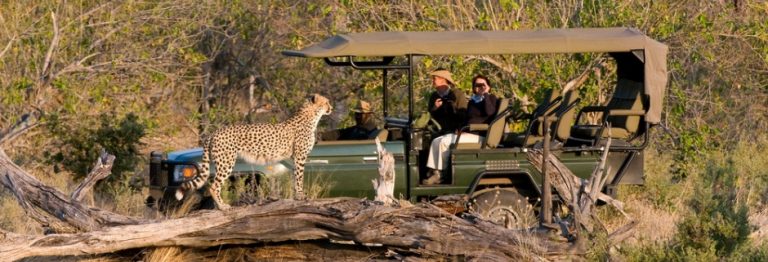Why is a safari in Botswana so expensive?

This is a question I am asked all the time! We may consider an excursion to the cultural highlights of Europe quite a grand expedition, but still, most of us can afford to visit the Louvre in Paris or the Sagrada Familia in Barcelona. However, when we look into going on safari in Botswana, with only basic facilities, poor infrastructure and many logistical problems, we find that it actually costs much more. Naturally, this is very confusing for most first-time visitors. I’d like to try and explain this puzzling state of affairs.
First of all there is the element of accessibility: with the exception of a few trunk roads connecting the major towns, the roads leading to the natural highlights of Botswana are simple sandy tracks or gravel. The landscape is extremely diverse, varying from dry scrub to marshy wetlands. In areas like the Okavango Delta, some places can only be reached by light aircraft or boats. Clearly, this requires specialised, reliable modes of transport such as expensive, tailor-made 4×4 vehicles to carry all the necessary supplies and equipment, not to mention passengers.
The level of difficulty in getting around is off-putting for the average traveller and so tourist numbers are relatively low. This factor alone clearly leads to higher individual costs. Moreover, the government of Botswana has chosen to promote a policy of ‘high cost-low volume’ in its tourism sector. They have found it necessary to take this step in order to protect their fragile ecosystems, thus preserving the very conditions which attract the visitor in the first place – rare and abundant wildlife in a pristine natural habitat.

While mass tourism would undoubtedly lead to lower costs, the negative environmental impacts are well known – natural habitat loss, pressure on endangered species, strain on resources, etc. In contrast to that, thanks to low human activity, the national parks of Botswana offer an unparalleled wilderness experience where you can enjoy true peace and freedom, and a rare opportunity to be close to nature. In addition, because safaris in Botswana strive towards ecotourism, your participation not only protects the wildlife but also benefits the economic development of local communities, empowering them and preserving their cultural integrity.
In summary, a safari can seem expensive when compared to other forms of holiday, but having outlined some of the reasons above, you can see that when it comes to a pure and natural wilderness experience, with peace, exclusivity, diversity and the rare priviledge of close-up interaction with wildlife in a completely natural environment, there is just no match for Botswana!
Despite these wonderful priviledges, it is important to note that a wide range of price options are still available. Yes, there are luxury lodges charging over $500 dollars per person per night, but these permanent set-ups do not give the real wilderness experience in my opinion. The fully-serviced mobile safari offers many variations in the price mix depending on the season and the number of services included. This type of tour offers you the greatest flexibility and has large numbers of operators, most of whom are locally owned and run. We can connect you with the local guides and professionals on a personal level for an authentic and affordable safari in Botswana.
